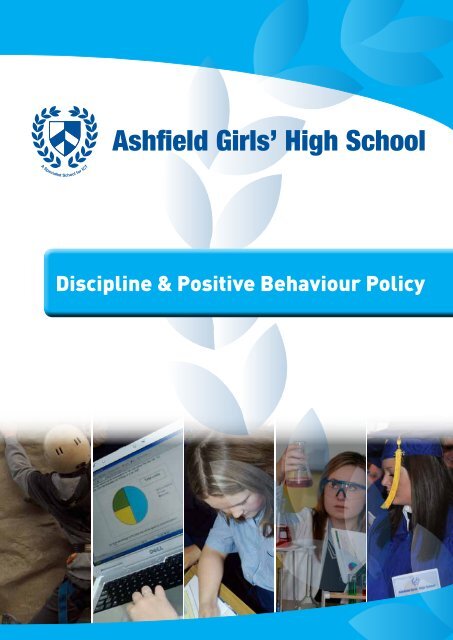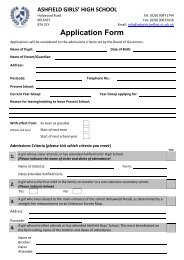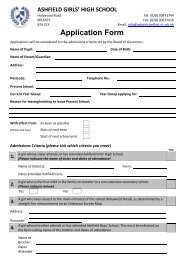Discipline & Positive Behaviour Policy PDF - Ashfield Girls' High ...
Discipline & Positive Behaviour Policy PDF - Ashfield Girls' High ...
Discipline & Positive Behaviour Policy PDF - Ashfield Girls' High ...
You also want an ePaper? Increase the reach of your titles
YUMPU automatically turns print PDFs into web optimized ePapers that Google loves.
<strong>Ashfield</strong> Girls’ <strong>High</strong> School<br />
A Specialist School for ICT<br />
<strong>Discipline</strong> & <strong>Positive</strong> <strong>Behaviour</strong> <strong>Policy</strong>
<strong>Discipline</strong> & <strong>Positive</strong> <strong>Behaviour</strong> <strong>Policy</strong><br />
2
<strong>Discipline</strong> & <strong>Positive</strong> <strong>Behaviour</strong> <strong>Policy</strong><br />
<strong>Ashfield</strong> Girls’ <strong>High</strong> School<br />
<strong>Positive</strong> <strong>Discipline</strong> <strong>Policy</strong><br />
“Each Different, Each Talented, All Valued”<br />
32
<strong>Discipline</strong> & <strong>Positive</strong> <strong>Behaviour</strong> <strong>Policy</strong><br />
Content<br />
School Mission Statement............................................................ 4<br />
School Aims.................................................................................. 5<br />
<strong>Positive</strong> <strong>Behaviour</strong> <strong>Policy</strong> Statement............................................ 6<br />
Rights and Responsibilities .......................................................... 7<br />
Six Rules for Success................................................................... 9<br />
<strong>Behaviour</strong> management - Rewards ........................................... 10<br />
Implementation of Reward System ............................................ 11<br />
Implementation of Reward System – Structure Overview ........ 12<br />
<strong>Behaviour</strong> management – Sanctions ......................................... 13<br />
Implementation of Sanctions – Structure Overview ................... 14<br />
<strong>Positive</strong> <strong>Behaviour</strong> Management................................................ 15<br />
<strong>Behaviour</strong> Plan………………………………………………………16<br />
4
<strong>Discipline</strong> & <strong>Positive</strong> <strong>Behaviour</strong> <strong>Policy</strong><br />
School Mission Statement<br />
<strong>Ashfield</strong> Girls’ <strong>High</strong> School aspires to help all members of the<br />
school community to improve the quality of their lives<br />
through learning, living, caring and the need to leave our<br />
mark on the world in which we live.<br />
5
<strong>Discipline</strong> & <strong>Positive</strong> <strong>Behaviour</strong> <strong>Policy</strong><br />
Aims<br />
The aim of the school is to provide each student with a secure and<br />
supportive learning environment for a programme of education which<br />
meets her individual needs and which brings her success and fulfilment in<br />
her school life and prepares her for life beyond school.<br />
In seeking to fulfil this aim, the school will endeavour to<br />
• Create an information rich environment where each student may<br />
reach her full potential<br />
• Provide a pastoral care system which gives support and guidance at<br />
all times<br />
• Promote self-confidence, self-respect, self-discipline, selfmotivation,<br />
initiative and positive attitudes<br />
• Promote strategies which enable students to develop a language for<br />
life and learning<br />
• Provide a curriculum which affords opportunities for students to<br />
develop a range of skills which promotes intellectual, social,<br />
emotional, aesthetic, spiritual and moral growth<br />
• Provide guidance which will prepare students for the challenges of<br />
changing patterns of work and leisure<br />
• Forge strong links with outside agencies and with the local<br />
community which it serves<br />
6
<strong>Discipline</strong> & <strong>Positive</strong> <strong>Behaviour</strong> <strong>Policy</strong><br />
<strong>Positive</strong> <strong>Behaviour</strong> <strong>Policy</strong><br />
This policy is based on the Department of Education ‘Pastoral Care in<br />
Schools; Promoting <strong>Positive</strong> <strong>Behaviour</strong>”<br />
The policy aims to:<br />
Create an environment of receptive students who can acquire the skills<br />
and knowledge enabling them to become lifelong learners in the global<br />
economy.<br />
Create an environment where teachers feel empowered to teach<br />
effectively.<br />
Create an environment based on mutual respect between all members<br />
of the school community where pupils develop the interpersonal skills<br />
needed to work cooperatively with others and have the ability to<br />
resolve problems or conflict in daily life.<br />
Create an environment where pupils are empowered. They take<br />
ownership of their own learning, they set personal targets and they<br />
take responsibility for their own actions.<br />
Create an environment where parents are empowered. They actively<br />
support the teaching and learning policies of the school and embrace<br />
the concept of lifelong learners.<br />
Create an environment of kindness and caring, a community in which<br />
pupils, parents and teachers feel valued and have an important role in<br />
promoting positive behaviour.<br />
7
<strong>Discipline</strong> & <strong>Positive</strong> <strong>Behaviour</strong> <strong>Policy</strong><br />
Rights and Responsibilities<br />
<strong>Ashfield</strong> Girls’ School community recognises the Rights and<br />
Responsibilities of all members. It is important that the key rights and<br />
responsibilities identified below are understood and form the basis of<br />
everyday interactions.<br />
Rights<br />
Pupils<br />
To be respected and valued as<br />
members of the school community.<br />
To be treated fairly.<br />
To be taught in a pleasant, safe and<br />
well-managed environment.<br />
To be listened to.<br />
To be consulted on matters that<br />
affects them.<br />
To get help and encouragement in<br />
their learning.<br />
To experience a broad and balanced<br />
curriculum.<br />
To make mistakes and learn from<br />
them.<br />
Staff<br />
To be respected and valued as<br />
members of the school community<br />
To express their views and<br />
To contribute to the teaching and<br />
learning policies and strategic<br />
planning in the school.<br />
To have opportunities for<br />
professional development alongside<br />
career pathways<br />
To have adequate and appropriate<br />
teaching resources.<br />
To have support from all members of<br />
the school community.<br />
Responsibilities<br />
Pupils<br />
To empathise with, respect and<br />
Value other members of the school<br />
community.<br />
To behave safely.<br />
To obey the school rules<br />
To work to the best of their ability in<br />
class.<br />
To seek help with work they have not<br />
fully understood.<br />
To come to school on time and to be<br />
suitably equipped for lessons.<br />
To accept ownership of their own<br />
behaviour and learning, and develop<br />
the skill of working independently.<br />
Staff<br />
To empathise with, respect and value<br />
other members of the school<br />
community.<br />
To behave in a professional manner<br />
at all times<br />
To ensure that lessons are well<br />
prepared and challenging taking into<br />
account the ability and special needs<br />
of the pupils<br />
To record, celebrate and reward<br />
pupil achievement<br />
To liaise with parents sharing<br />
successes or concerns they may<br />
have about a pupil’s progress.<br />
To be a good role model in terms of<br />
their enthusiasm and enjoyment of<br />
learning<br />
To create an environment where all<br />
8
<strong>Discipline</strong> & <strong>Positive</strong> <strong>Behaviour</strong> <strong>Policy</strong><br />
Parents<br />
To be respected and valued as<br />
members of the school community<br />
To have a welcoming, safe, wellmanaged<br />
and stimulating<br />
environment for their child’s<br />
education<br />
To be involved in key decisions<br />
regarding their child’s education<br />
To be informed promptly if their child<br />
is ill or has an accident or if the<br />
school has concerns about their child<br />
To have a well planned, broad,<br />
balanced and appropriate curriculum<br />
To be well-informed and have<br />
opportunity to input into school<br />
procedures<br />
To have concerns dealt with<br />
promptly and sympathetically.<br />
pupils can learn and, if this<br />
environment is in danger of breaking<br />
down, seek help and support from<br />
their H.O.D. Year Head or Head of<br />
Pastoral Care.<br />
Parents<br />
To recognise the need for regular<br />
attendance, good punctuality and<br />
sound preparation for the day ahead<br />
at school<br />
To liaise with school staff keeping<br />
them informed of any relevant<br />
information effecting their child’s<br />
ability to learn<br />
To work in partnership with the<br />
school attending planned meetings,<br />
interviews and school functions<br />
To be a positive role model for their<br />
child in their relationship with the<br />
school and in valuing teaching and<br />
learning.<br />
9
<strong>Discipline</strong> & <strong>Positive</strong> <strong>Behaviour</strong> <strong>Policy</strong><br />
Six School Rules for Success in <strong>Ashfield</strong> Girls<br />
1. Show respect and consideration to all members of our school<br />
community.<br />
2. Value the opportunity to learn – set personal goals and<br />
always work to achieve your full potential.<br />
3. Ensure high standards of safety within the school community<br />
by behaving responsibly.<br />
4. Promote the reputation and positive image of our school at<br />
all times – take pride in our success.<br />
5. Show high standards of preparation for a successful school<br />
day in terms of equipment, home study, punctuality and<br />
attendance.<br />
6. Resolve worries or problems by asking for help.<br />
(These six <strong>Ashfield</strong> rules are translated within every subject<br />
department and extracurricular activity of the school)<br />
10
<strong>Discipline</strong> & <strong>Positive</strong> <strong>Behaviour</strong> <strong>Policy</strong><br />
<strong>Behaviour</strong> Management - Rewards<br />
Rules and procedures protect rights and define responsibilities.<br />
Rewards and sanctions are necessary to encourage and maintain<br />
the Six Rules for Success in <strong>Ashfield</strong>.<br />
Objectives;<br />
<strong>Ashfield</strong> Girls’ <strong>High</strong> School system of rewards aims to,<br />
• Be fair and consistent.<br />
• Promote self-esteem.<br />
• Establish and maintain a climate in which pupils come to<br />
appreciate what constitutes acceptable and positive<br />
behaviour.<br />
• Contribute to the ethos of the school – “Each different, each<br />
talented, all valued.”<br />
• Provide opportunity for all pupils to gain recognition for<br />
positive behaviour.<br />
• Encourage pupils to take responsibility.<br />
• Promote emotional literacy.<br />
• Provide opportunity for involvement of the whole school<br />
community.<br />
The school community uses a full range of rewards including nonverbal,<br />
verbal, tangible or intrinsic. Staff continue to develop<br />
appropriate strategies and review rewards that may become outdated<br />
and considered inappropriate to particular age groupings or<br />
social groupings.<br />
11
<strong>Discipline</strong> & <strong>Positive</strong> <strong>Behaviour</strong> <strong>Policy</strong><br />
Implementation of Rewards<br />
<strong>Ashfield</strong> Girls’ <strong>High</strong> School Teaching and Learning <strong>Policy</strong><br />
recognises the importance of a learning environment characterised<br />
by,<br />
• Mutual respect<br />
• Learning partnerships<br />
• Variety of approaches<br />
• <strong>High</strong> expectations<br />
The implementation of rewards plays an important role in<br />
developing and supporting these characteristics.<br />
12
<strong>Discipline</strong> & <strong>Positive</strong> <strong>Behaviour</strong> <strong>Policy</strong><br />
EXAMPLE REWARDS:<br />
BASIC REWARDS<br />
HIGHER LEVEL<br />
REWARDS<br />
Implementation of Rewards<br />
Overview of Implementation Structure<br />
Whole School Community<br />
(Pupils, Teachers, Non-teaching staff, Staff, Parents, Student Council, School Prefects, Local businesses)<br />
Subject-based Rewards<br />
Non-subject-based Rewards<br />
(including out of hours learning)<br />
Subject Teacher<br />
COMMUNICATION<br />
Heads of Department<br />
Form Tutor<br />
Head of Year<br />
<strong>Positive</strong> comments in pupil planner.<br />
Verbal/nonverbal recognition<br />
<strong>Positive</strong> comments in daily progress report sheet<br />
Display of work<br />
Photographic record display<br />
Term report<br />
Record of Achievement<br />
Letter to parents/guardian<br />
Special responsibility e.g. pupil mentor<br />
Award at Annual Prize Day<br />
Cinema vouchers<br />
Bespoke certificate<br />
Subject honours<br />
Attendance/punctuality Awards<br />
<strong>Positive</strong> comments in pupil planner<br />
Verbal/nonverbal recognition<br />
<strong>Positive</strong> comments in daily progress report sheet/display<br />
of work<br />
Photographic record display<br />
Bespoke Certificate<br />
Record of Achievement<br />
Recognition Year Head Assembly<br />
Letter to parents/guardian<br />
Special responsibility e.g. form captain<br />
Cinema vouchers<br />
Term report<br />
Rock Challenge Prize Evening<br />
Annual Prize Distribution (e.g. Courtney Award for <strong>Positive</strong> Contribution to School Life}<br />
Sponsored Awards (e.g.Johnston Campbell Award for Endeavour)<br />
The Principal’s Award (New PIN Award in 2004 given for goal setting and engagement in school life)<br />
National Awards (e.g.Diana Princes of Wales Memorial Award /Nationwide Award for Voluntary Endeavour)<br />
12<br />
13
<strong>Discipline</strong> & <strong>Positive</strong> <strong>Behaviour</strong> <strong>Policy</strong><br />
<strong>Behaviour</strong> Management – Sanctions<br />
Sanctions help to uphold the Six Rules for Success. They provide<br />
pupils with clearly defined boundaries and, in so doing; they<br />
encourage acceptable and appropriate behaviour.<br />
Objectives;<br />
<strong>Ashfield</strong> Girls’ <strong>High</strong> School aims to ensure that sanctions…<br />
• are fully UNDERSTOOD by the whole school community.<br />
• are applied FAIRLY and CONSISTENTLY.<br />
• are applied EXPEDITIOUSLY after the offence<br />
• SEPARATE the behaviour from the pupil<br />
• are PROPORTIONATE to the offence<br />
• DEFUSE and DO NOT ESCALATE the situation<br />
• allow the pupil to SAVE FACE<br />
• TAKE ACCOUNT of age, maturity and special needs of the<br />
pupil or any other relevant circumstances.<br />
Sanctions MUST NOT…<br />
• be applied to entire classes or groups of pupils, when the<br />
guilty parties have not been identified.<br />
• degrade pupils or cause them public or private humiliation.<br />
• Involve physical force<br />
14
<strong>Discipline</strong> & <strong>Positive</strong> <strong>Behaviour</strong> <strong>Policy</strong><br />
EXAMPLE SANCTION<br />
S:<br />
BASIC<br />
SANCTIONS<br />
HIGHER LEVEL<br />
SANCTIONS<br />
Implementation of Sanctions<br />
Overview of Implementation Structure<br />
Whole School Community<br />
(Pupils, Teachers, Non-teaching staff, Staff, Parents, Student Council, School Prefects, Local businesses)<br />
Subject-based Sanctions<br />
Nonsubject-based Sanctions<br />
(including out of hours learning and<br />
free movement around school)<br />
Subject Teacher<br />
COMMUNICATION<br />
Heads of Department<br />
Form Tutor<br />
Head of Year<br />
Verbal or non-verbal warning<br />
Rule reminder<br />
Subject counselling<br />
Withdrawal of privileges<br />
Phone call to parent<br />
Change of seating plan<br />
Subject detention<br />
Learning support unit (where learning is seriously<br />
affected)<br />
General detention<br />
Completion of additional work to compliment or<br />
reinforce current studies (not lines)<br />
Referral to a more senior member of staff<br />
Daily report<br />
S.E.N. referral<br />
Parent/pupil interview<br />
Temporary removal to another colleague<br />
Verbal or non-verbal warning<br />
Rule reminder<br />
Withdrawal of privileges<br />
Phone call to parent<br />
Parent/pupil interview<br />
Pupil counselling<br />
General detention<br />
Carry out a useful low-level task<br />
Daily report<br />
S.E.N.C.O referral<br />
Referral to a more senior staff member<br />
Senior teachers<br />
Vice-principal<br />
Principal<br />
Suspension<br />
expulsion<br />
15
<strong>Discipline</strong> & <strong>Positive</strong> <strong>Behaviour</strong> <strong>Policy</strong><br />
<strong>Ashfield</strong> Girls <strong>High</strong> School promotes a model of inclusion in<br />
education and it is only in the case of very serious misdemeanours<br />
that a pupil will be suspended or expelled from school. There is no<br />
prescriptive list of such misdemeanours and each case will be<br />
considered carefully before such action is taken. It is important<br />
however to state that the following behaviours are not acceptable<br />
in our school community and could fall into the “serious” category.<br />
• Bullying and bullying type behaviour<br />
• Stealing<br />
• Fighting / physical abuse<br />
• Inappropriate language / verbal abuse<br />
• “Cyber” abuse<br />
• Vandalism<br />
• Using or having illegal substances and substance abuse<br />
<strong>Positive</strong> <strong>Behaviour</strong> Management<br />
Staff will endeavour to develop personal strategies for positive<br />
behaviour management. This will include preventative and<br />
corrective strategies aimed at promoting and sustaining a positive<br />
learning environment.<br />
<strong>Positive</strong> Classroom<br />
Management<br />
Preventative Strategies<br />
• Arrive at class on time<br />
• Have an aesthetically pleasing<br />
and functional classroom<br />
• Use a seating plan consistently<br />
• Use clear routines<br />
• Provide opportunities for pupils<br />
to experience success<br />
<strong>Positive</strong> Classroom<br />
Management<br />
Corrective Strategies<br />
• Tactical ignoring (where<br />
appropriate).<br />
• Simple brief directions (finish<br />
with “thanks” or “please” and<br />
use the pupil’s first name).<br />
• Non-verbal reminders.<br />
• Rule reminders.<br />
16
<strong>Discipline</strong> & <strong>Positive</strong> <strong>Behaviour</strong> <strong>Policy</strong><br />
• Know your pupils’ names!<br />
• Use differentiation.<br />
• Let pupils know what<br />
constitutes “finished”<br />
• Give work in small manageable<br />
steps.<br />
• Use praise/criticism at a<br />
• ratio of 4:1.<br />
• Greet each individual by name<br />
and with eye contact.<br />
• Find out and talk to learners<br />
about their lives, hobbies and<br />
interests.<br />
• Provide opportunities for<br />
expressing emotions.<br />
• Use display to demonstrate that<br />
we value our learner’s work.<br />
• Use display to reinforce<br />
learning.<br />
• Use display for affirming<br />
messages.<br />
• Communicate high<br />
expectations and sense of<br />
pace and challenge positively.<br />
• Enable learners to feel it is ok<br />
to make mistakes.<br />
• Give feedback, which is<br />
constructive, educative and<br />
positive.<br />
• Catch learners doing well and<br />
celebrate it with them.<br />
• Encourage learners to think<br />
and talk about themselves and<br />
others positively.<br />
• Ensure all learners experience<br />
success and affirmation each<br />
day.<br />
• Have a meaningful<br />
conversation with each learner<br />
every day.<br />
• Use “I” messages not “You”<br />
• Give “take up” time.<br />
• Make consequences clear (with<br />
choices)<br />
• Describe the reality of the<br />
situation.<br />
• Focus on the misdemeanour<br />
rather than the pupil.<br />
• Allow right to reply.<br />
• Partial agreement.<br />
• Defuse rather than escalate the<br />
situation.<br />
• Allow the pupil to save face and<br />
encourage a more positive<br />
attitude in the future.<br />
• Take account of the age and<br />
degree of maturity of the pupil<br />
and special needs.<br />
• Follow-up, follow through<br />
(certainty not severity).<br />
17
<strong>Discipline</strong> & <strong>Positive</strong> <strong>Behaviour</strong> <strong>Policy</strong><br />
17<br />
18
19<br />
<strong>Discipline</strong> & <strong>Positive</strong> <strong>Behaviour</strong> <strong>Policy</strong>
Last Updated: November 2013<br />
A Specialist<br />
School forICT<br />
SSAT<br />
inquire<br />
Inspire<br />
Innovate<br />
Impact<br />
Principal: Mrs A Mungavin BA DipEd PQH (NI)<br />
Holywood Road • Belfast • BT4 2LY • Tel: 028 90471744 • Fax: 028 90672416<br />
E-Mail: info@ashgirls.belfast.ni.sch.uk • Internet: www.ashfieldgirls.org










